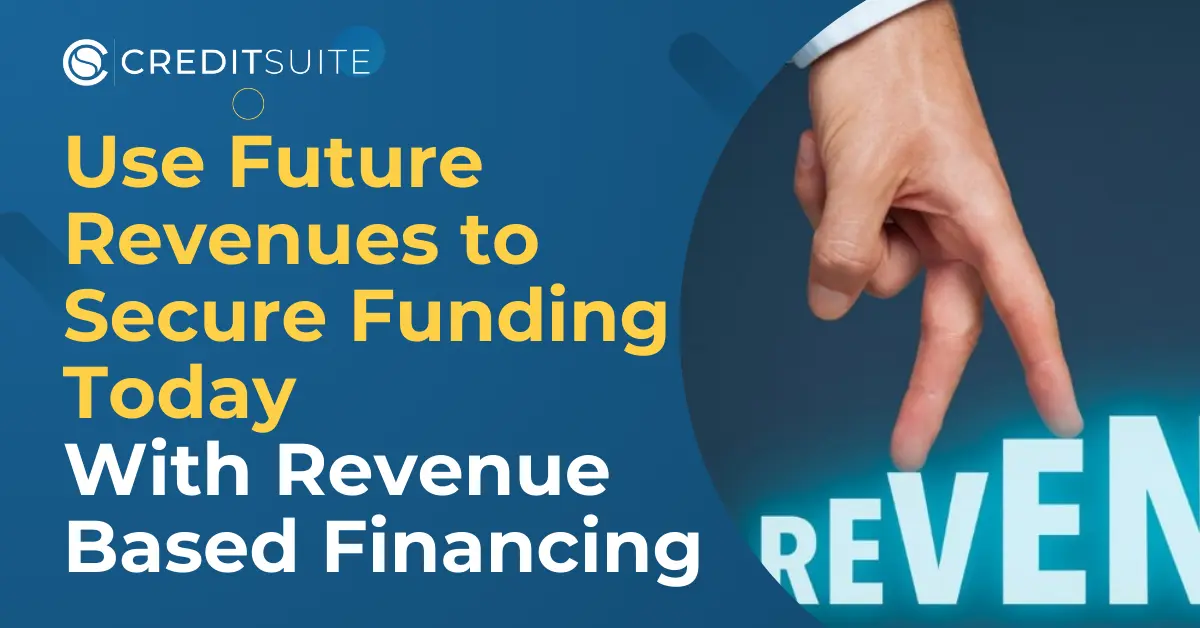Did you know you can leverage your cash flow to get business funding? For businesses with some time under their belts and predictable revenue coming in, revenue based financing can be an ideal solution.
Revenue-based funding gets you working capital based on predicted future revenue. Consider this financing option.
What is Revenue-Based Financing?
Revenue-based funding is a way for small businesses to raise growth capital by pledging a certain percentage of their ongoing future revenues in exchange for money invested. It’s not really debt financing and it’s not really equity financing, either.
Investors become essentially business partners with the small business owner. As a result, costs can be higher than for, say, a traditional bank loan. But the company does not have to dilute its equity or take on interest payments.
Instead, revenue-based finance is paid from stable revenue. The business incurs a monthly payment which they pay from their revenue, up to a repayment cap.
Unlike with a traditional loan, the repayment amount is based on monthly revenue. This means the amount of time for repayment of revenue-based loans fluctuates with how well a business is doing. Revenue growth means higher payments.
Your credit score, whether personal or for your company, is not truly a consideration. As a result, a small business owner with bad credit can still get revenue financing. Approvals are fast.
These days, venture capital firms are starting to use it as a means of funding businesses which sell Software as a Service (SaaS), because SaaS capital is predictable.
How Does it Work?
How does revenue-based financing work?
You may hear terms like merchant cash advance or invoice financing or cash flow financing. Or maybe purchase order financing or factoring. All of these are fairly similar, and they are all based on company revenue.
But unlike with merchant cash advances, your small business does not have to have substantial credit card sales.
With this kind of financing, businesses tend to borrow from $50,000 to $3 million. This depends on several factors including their annual revenue run rate (ARR) or their monthly recurring revenue (MRR). ARR refers to how much the business expects to make in the future.
MRR measures how much the business has consistently made over a set period of months.
Most investors will set maximum loan amounts for up to a third of the company’s ARR or four to seven times their MRR. The lender calculates the loan amount from a repayment cap, which is often set at 0.4 – 2 times the principal investment. However, this varies for each company.
A monthly repayment percentage will often be set at 2 – 3% of the business’ monthly revenue. However, it can run as high as 10%. The cap is set, instead of charging interest.
How to Qualify For It
Much like a revenue bond for an airport is secured with the operating revenue of the airport, qualifying for such financing means assuring a lender that your company can pay back the loan.
You will need to prove MRR. However, a provider such as Lighter Capital does not even require that your business be profitable yet. They want you to have an MRR of at least $15,000.
They also want to see that your business has a diverse customer base. This is so you won’t go under if one type of customer loses interest or becomes scarce.
For a provider like United Capital Source, your business will have to be pulling in $120,000 or more per year. You will need to have time in business for four months or more. And your personal credit score will need to be 525 or better.
But with Saratoga Investment Corp., your business will generally have to have revenues of $8 million to $250 million and EBITDA of $2 million or greater to assure repayment. They want to see strong margins and free cash flow, with stable revenues and stable historical performance.
Your business is more likely to qualify with them if you have modest capital expenditure and working capital requirements. This helps assure them that repayment will be forthcoming.
Pros of Revenue-Based Financing
Pro 1 – You Retain Full Control of Your Business
 Venture capitalists will give you money—but they want a piece of the pie. And they often want a very large slice of your revenues. Diluting equity means you aren’t the only one making business decisions, too.
Venture capitalists will give you money—but they want a piece of the pie. And they often want a very large slice of your revenues. Diluting equity means you aren’t the only one making business decisions, too.
Royalty-based financing means you don’t have to rely on venture capital to stay in business or take your small business to the next level. And if you have a somewhat conventional business, like a dry cleaner, venture capital is not likely to be an option, anyway.
Unless your business is truly disruptive, venture capital providers won’t be interested.
Pro 2 – No PG!
Unlike with a conventional business loan, you will not have to personally guarantee a revenue loan. The financing firm does not consider your personal credit as much of a factor in their decision to lend. Rather, your gross revenue is.
Therefore, you might not have to brace yourself (and your personal credit score) for a hard inquiry, which causes a personal credit score to drop. It’s one of the few kinds of business funding where there can be no need to jeopardize your personal credit score.
Pro 3 – Faster Funding
You won’t have to make several pitches to get the financing you need. Most lenders will make their decisions and offer funding within a month. Contrast this with venture capital which can take a lot of wooing, or a loan from the SBA, which can take months to put money in your hand.
If you need to act quickly, say, to take advantage of a limited-time sale or act before interest rates rise, revenue based funding can put money in your hands more quickly. In this way, it’s a bit like a bridge loan, except there’s no interest to pay.
Pro 4 – You Can Get it Even With Bad Personal Credit
Much as we would love to separate personal and business credit, the truth is that your personal credit will always be a factor in whether you get business funding, how much you get, and at what terms.
Until it’s not.
But you tend to not get to that point unless your business is bringing in significant revenue. So, in the meantime, if you’ve got regular, predictable revenue coming in, but it’s not eye-popping superlative, business revenue funding is a practical way to get funding now, without having to wait for your business to turn into a superstar revenue-generating machine.
Cons of Revenue-Based Financing
Con 1 – You Have to Keep Producing Revenue
Of course, you want your small business to produce revenue. But sometimes the economy has different plans. The repayment of your loan amount is contingent on your business bringing in stable revenue.
Therefore, if your business is not in a stable market, repayment could turn out to be nigh well impossible. In particular, startups tend to not have stable revenue yet. For them, equity financing or debt financing can be better choices.
Con 2 – There is a Distinct Lack of Regulation
A company that is desperate for growth capital should be cautious when choosing this form of funding, as an RBF investor has few checks on them.
Small business owners seeking this kind of funding should check agreements closely to avoid predatory lending practices. If the repayment amount is very high, it will not be much better than regular debt financing or venture debt.
Due to the lack of protections, prudent company owners should try to investigate investors before signing anything.
Con 3 – You Won’t Get as Much Money
This financing provides about three to four months of a business’s monthly recurring revenue. And that’s it!
Contrast that with equity financing, where you may get a lot more. Of course, past success is no guarantee of future earnings. And that’s why the amount of funding you can get tends to be less.
As a result, you can get this sort of funding yet still have to supplement it with something else. And if you are getting revenue-based funding because your personal credit is poor, that something else probably won’t be an SBA loan.
Con 4 – You Will Be Making Monthly Payments Until the Debt is Extinguished
Bad economy? You pay. Supply chain disruption? You pay. Inflation? You pay. Does half your workforce just quit? You guessed—you will still have to make a monthly payment.
How do you get out of making a payment every single month? You pay off the debt. Or, you can sell the business and make it clear that the debt comes as a package deal with your equipment, etc. So be prepared to sell the business for less than you would prefer.
This is because taking on your debt would increase the buyer’s upfront capital expenditure.
Or, maybe, the debt would be discharged in bankruptcy.
But since it’s a secured debt, and secured creditors tend to “get in line” for the remaining money earlier than other creditors do, you may find that a good chunk of the proceeds from the bankruptcy liquidation would go to satisfying this debt.
Revenue-Based Financing vs Traditional Bank Loans
When we are thinking about company lending, very often we think of these much more traditional term loans—and nothing else. But a company can have other choices, and they can sometimes be better.
If the company owner has poor personal credit, then, often, traditional bank lending is off the table. If the company owner can get around this issue with a credit partner or a guarantor, then they may be able to salvage the situation.
But for revenue lending, a FICO score in the mid-500s can be good enough, thereby obviating the need for a partner.
A bank will also want to see extensive documentation, such as tax returns (both personal and company), the business plan, recent bank statements, and more. Contrast this with revenue lending, where the provider mainly just wants to confirm stated revenues.
Another difference between the two is the speed with which you get growth capital. With revenue lending, you will often get funds within a month. But with bank lending, it can take longer.
However, keep in mind that an online lender can potentially have a faster timetable than even a revenue lending provider. Their requirements may also be more relaxed, as may be their credit score minimum.
When to Consider Revenue-Based Financing?
Are you thinking about pursuing this type of financing? It will not make any sense to seriously consider it unless your chances of approval are high (otherwise, why bother to apply in the first place?). But this is true of all loan options. 
As a result, your business will have to be bringing in revenue on a regular basis. A small business with too many ups and downs in revenue will not be a good candidate for this type of financing.
Also, consider your alternatives. Equity financing does not have to come from VCs. It can also come about by selling equity in your business to angel investors. They tend to want less equity and less control.
So, they can be a decent alternative, particularly if you are all right with another aspect of equity financing—having to split the profits. And then there’s the other part of selling equity—having less control of your own small business.
Debt financing can still be a viable option if you have the means to pay back a lender. In particular, if you have good personal credit, you may find your terms for taking on debt are good enough that it would be a better choice for business financing.
Takeaways
For a company with good, predictable monthly revenue, this type of business funding can be a good choice for fast cash with relatively easy repayment and no lost equity.
But entrepreneurs should check out every provider carefully.
Or you can contact us. We take the guesswork out of finding the right financing for your business and its unique needs.

